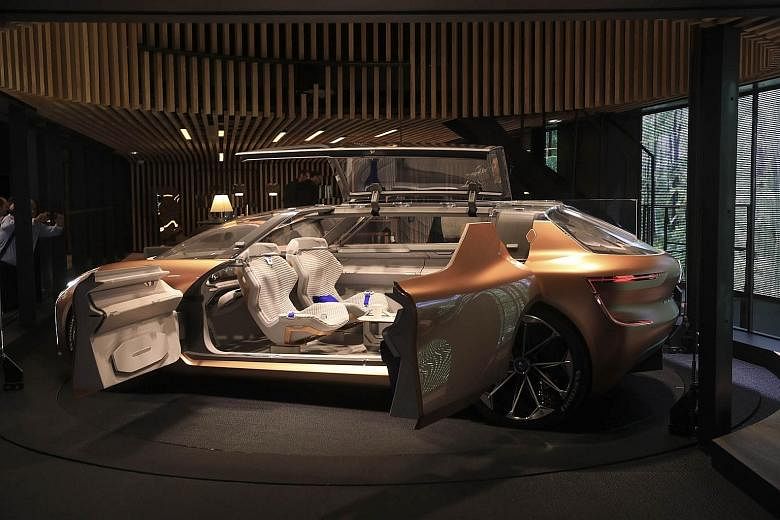FRANKFURT • German carmakers are accelerating efforts to drive up interest in automated cars at the International Motor Show (IAA) in Frankfurt, but most people in the car-mad country have yet to be convinced by the technology.
Curious visitors to the biennial trade fair, which lasts until tomorrow, can entrust their lives to a computer in a specially created car at a test track overlooked by Daimler and Volkswagen's giant stands.
An expert is behind the wheel, if not grasping it firmly, to demonstrate how a car studded with sensors and cameras can perform an emergency stop, react to a sudden lane change or park itself - even while hauling a horse trailer.
"This is crazy," one passenger said as the car headed to an obstacle at 50kmh before braking sharply without the driver touching the controls.
Rival carmakers and parts suppliers - Daimler, Volkswagen, Audi, Bosch, Continental and ZF - came together for the scheme, part of a broader push for acceptance as high-tech American firms such as Google and Tesla appear to be streaking ahead.
At present, just 26 per cent of Germans say they would ride in an autonomous car. Even fewer - 18 per cent - would own one, a recent survey from consultancy firm Ernst & Young found.
Beyond the thrill of the test track, cars will need to perform such manoeuvres reliably in all kinds of situations if carmakers are ever to attain the highest "level five" of autonomy - meaning a car that can do without a driver.
"It will take time but it's the future," said Ms Lena Dickeduisberg, a student.
Salesman Randolf Mayer, 61, said: "What a dream it would be, a car that takes me from A to B while I read the paper or my clients' documents. But maybe I'm just saying that because of my age."
The two are far from typical among Germans, long wedded to the idea that driving should be pleasurable.
Austrian attendee Georg Pfennig said automation "makes sense for young people or the elderly, who might have trouble with some manoeuvres".
Mr Lars Heider, an engineering student, thinks self-driving cars "could drive as a convoy on motorways where everything is automated", but they are not "for shopping in town". "Unless everyone is using one, but you have to be able to afford a self-driving car," he added.
The auto industry is all too aware of the cost of automation, which remains "very high", said Mr Patrick Koller, chief executive of parts supplier Faurecia.
Joint investments in research and development have become the rule, such as German carmaker BMW's alliance with United States-based chipmaker Intel, Israeli smartcamera firm Mobileye and Italian- American carmaker Fiat Chrysler.
Elsewhere, Mercedes-Benz maker Daimler has joined forces with parts supplier Bosch, while Volkswagen is drawing on its luxury subsidiary Audi. Audi, BMW and Daimler pooled their cash to buy Here, a company specialising in the hyper- detailed maps that are vital for autonomous driving.
But ordinary folk must be convinced that autonomous driving is safe before their reluctance can be overcome, said the Centre of Automotive Management, a research institute near Cologne.
Still, Mr Rolf Bulander, head of Bosch's mobility division, is optimistic, saying he believes "people will get used" to the increasing power and adaptability of driving- assistance systems.
But it could be a long journey before the majority of drivers plug into the idea.
AGENCE FRANCE-PRESSE

